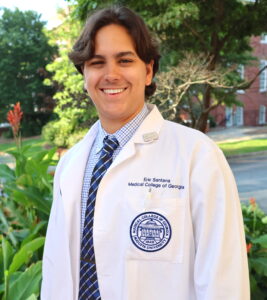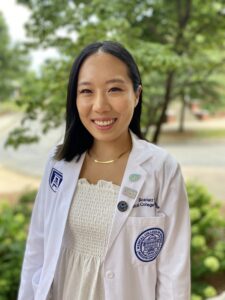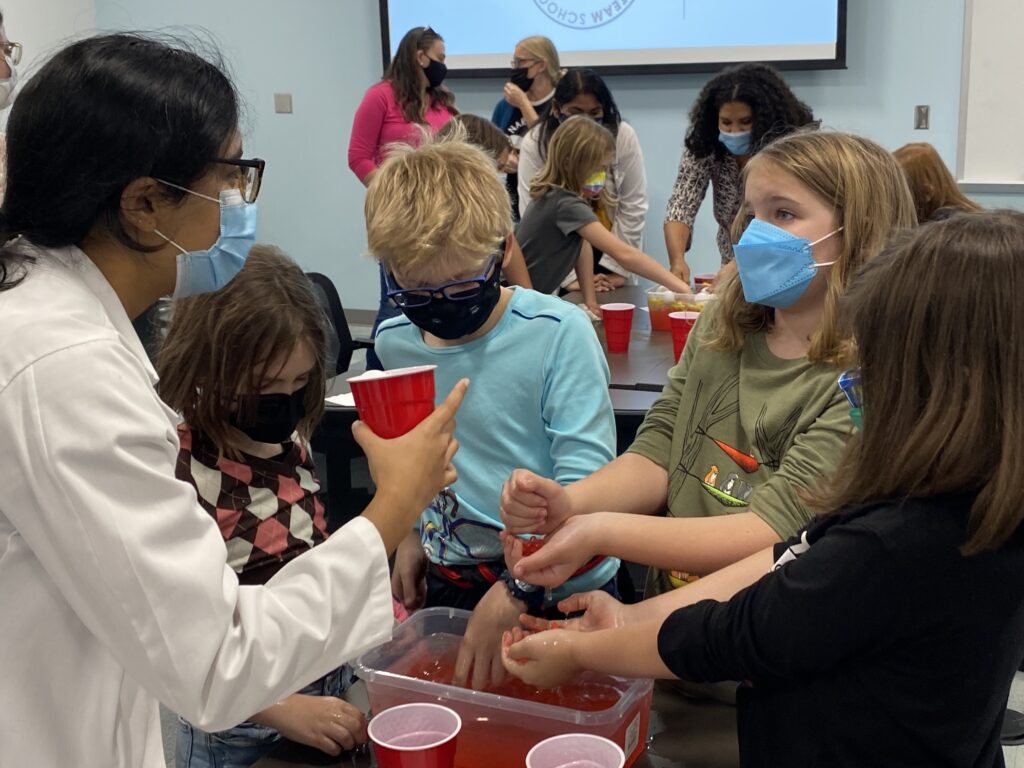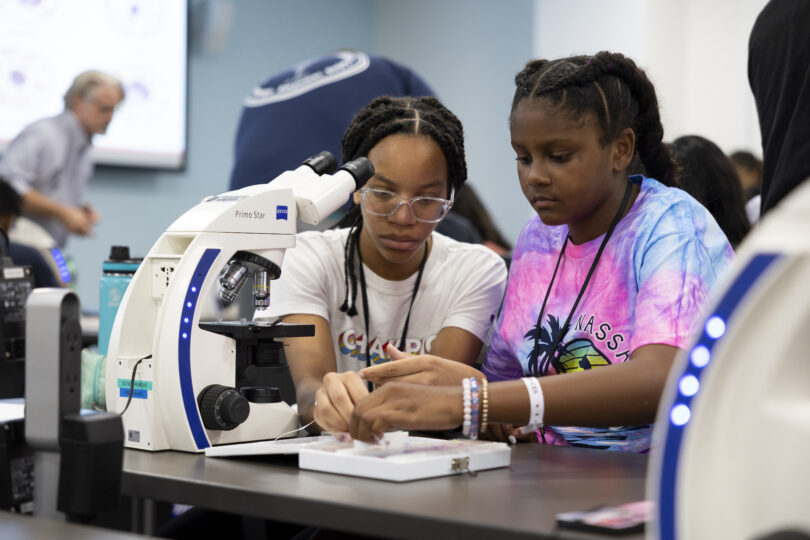Since its founding, the Augusta University/ University of Georgia Medical Partnership has sought to not only increase the number of physicians in Georgia, but also ensure great care for communities across the state.
This starts in the classroom, but students take it to heart even off campus and throughout the Athens community.

Eric Santana is a third-year AU/UGA Medical Partnership student and founder of the local Young Physicians Initiative chapter. (Courtesy AU/UGA Partnership)
As a first-year medical student, Eric Santana knew the power of mentorship. Through the Young Physicians Initiative, an Atlanta-based program for teenagers, Santana had a network of medical students and professionals to turn to as he applied to medical school. He wanted to make sure others had that same resource.
“Through the YPI, my brother and I really benefited, and it helped us both get into medical school,” said Santana, a Cuban American whose family immigrated to the United States just before he was born. “And at its base, it’s a mentorship program that uses medical students to connect to their community. It’s a low-time commitment but really high-impact program.”
A few months out from his first day of classes, Santana contacted the AU/UGA Medical Partnership. And Tai Sherman, campus director of external affairs, had good news—other students were excited to forge connections in the community.
Centered on collaboration
Scarlett Kim, now a fourth-year medical student, had also contacted Sherman. She wanted to support students from all backgrounds and help them enter the medical field as well.

Scarlett Kim is a fourth-year medical student and former president of the Pathway to Medicine Program at the AU/UGA Medical Partnership. (Courtesy AU/UGA Medical Partnership)
“We wanted to look at what we could do, for medical students who want to learn more about being involved in the community,” said Kim, whose background is in public health. “I wanted to share that passion and understanding that health goes past the biomedical process, that our campus can be open as a community resource.”
To create a program that best fit the community’s needs, they sat down and planned. The students brought their passion to the table, and Sherman brought 25 years of nonprofit experience. The resulting product was the Pathway to Medicine Program, a network of community outreach programs that bring medical students to elementary, middle and high school students throughout Athens-Clarke County.
“These students feel lucky and supported and loved on this campus, and they all want to be a part of diversifying medicine moving forward,” Sherman said. “The Athens community has so much to offer regarding diversity, and our students are able to go out and practice in the community, practicing primary care and mentoring students.”
Connection to community
From hands-on assignments that explain the scientific method and medical diagnostics to community clinics and health advocacy, AU/UGA students work to give back. They are able to connect with students from backgrounds that are considered underrepresented in the medical field, and they make a career in medicine feel more accessible.
“There really is something that is so special about igniting that passion when you’re younger,” said Kim, who served as president of Pathway to Medicine for two years. “So students are seeing people who are not that much farther ahead in life, moving down the path to becoming a doctor, and maybe they can see, ‘Hey, if I put in the work, I can do this too.’”
Clarke County School District students come to the medical campus for tours, to see the numerous resources available, and AU/UGA students visit community partners to host panels, answer questions and provide community clinics.
“Our curriculum includes community population health, where students provide primary care with different organizations around Athens,” Kim said. “I think through that the perception of our medical school has garnered a lot of interest in terms of free medical care provided. But I think the Pathway to Medicine program has added on to the larger awareness of what is available and what is available, especially to parents.”
The local Young Physicians Initiative chapter, founded by Santana, works with the Clarke County School District’s Career Center. Medical students teach two classes a semester, walking students through case studies and a variety of interactive lessons designed to teach the fundamentals of medical science.
“The exposure, the level of knowledge these students have is outstanding,” Santana said. “They’re working with manikins in simulations, well above what I was able to do in high school. So our goal was to design a program specific to their resources, but also using YPI’s curriculum.”
And while they work with close to 60 students a semester, Santana said encouraging even one student to enter medicine is a success.

Students from Double Helix STEAM School participate in a lesson from Pathway to Medicine. (Courtesy of AU/UGA Medical Partnership).
“One semester, we had a student who was always interested in the discussion,” Santana said. “We saw how passionate she was, and at the end of the year she said that her whole trajectory had changed. After speaking with us, she said she knew college was going to be possible. That’s when I really saw how our work was paying off.”
They were able to connect the student with resources for her college application, and once she was accepted, she met with on-campus mentors. Now, she’s on her way to complete her four-year degree with her eyes set on medical school in the future.
There are benefits for the medical students as well, Santana said. By breaking down case studies for middle and high school students, medical students are improving their communication skills for future patients. And by working with students from diverse backgrounds, they can connect with more patients in the future.
“We were founded to help with the physician shortage in Georgia, and particularly in primary care,” Sherman said. “About 70 percent of our graduates go into primary care, and we’ve found that the earlier you introduce doctors to primary care, they are more likely to follow that path. We need doctors who can work with underserved populations, especially, and this is building that pathway.”
And these pathways are here to stay. Through the Pathway to Medicine Program, the AU/UGA Medical Partnership has structured a foundation that includes open communication with community partners, grows to meet those needs and is sustainable as students graduate and more student leaders join.
“It’s amazing to see that this was not just an effort my classmates and I were passionate about,” Kim said. “We don’t want this to be somewhere we go for four years and then leave. We want to be involved in Athens, to make sure this is not only beneficial for us as medical students, but it is beneficial to the people around us.”








